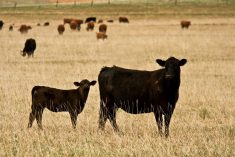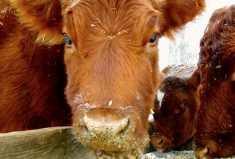Compared to last week, western Canadian feeder cattle markets traded $5-$8 lower on average, with yearlings dropping as much as $10-$12 in certain areas.
It appears buyers are incorporating a risk discount due to uncertainty in beef demand longer-term. Rising unemployment levels, sluggish consumer confidence and a sharp drop in disposable income are all factors weighing on the cattle complex. Backgrounding operators have tried to stretch out the feeding period on fall-placed calves, which hasn’t been a positive experience. Demand for grassers has also subsided. The farmer-cattle producer is finally realizing this COVID-19 pandemic may last longer than earlier anticipated. Even these producers don’t want to be holding high-priced inventory.
Read Also

U.S. grains: Soy futures post biggest monthly gain in nearly five years on China trade optimism
U.S. soybean futures climbed to a 15-month high and posted their biggest monthly gain in nearly five years on Friday following a rally fueled by the prospect of revived exports to China.
CME August live cattle futures are down US$32 from January highs, while September feeder cattle futures are down US$40 from the peak in winter. Earlier in March, the western Canadian feeder market divorced from the futures board, but has inevitably succumbed to the current environment. Many auction barns had limited volumes over the past week, as only essential players are allowed into the arena.
In central Alberta, mixed medium-frame steers on light grain ration weighing 875 lbs. were quoted at $152 while tan heifers averaging just over 900 lbs. were valued at $146. Manitoba and Saskatchewan prices were approximately $4-$8 below the main feeding regions of Alberta. U.S. feeder markets were down $12-$15 from last week, contributing to the negative tone in the eastern Prairie regions. In southern Manitoba, Charolais-based steers weighing 825 lbs. were valued at $158 while tan heifers weighing 870 lbs. were quoted at $133.
Calves were quite variable across the Prairies. In southern Alberta, Simmental-blended steers weighing just over 550 lbs. were valued at $213, but similar-weight steers in central Saskatchewan were quoted at $220. The finishing feedlot has moved to the sidelines for the time being. The farmer-cattle producer who purchases calves one time per year still has some buying power.
Alberta fed cattle prices for the August and September timeframe are expected to be around $120, given Friday’s futures close. The April 2021 live cattle futures reflect an Alberta cash price around $139-$141. The price variance between weight categories reflects the economics for feeding with the finished animal sold into the appropriate marketing period.
— Jerry Klassen manages the Canadian office of Swiss-based grain trader GAP SA Grains and Produits Ltd. and is president and founder of Resilient Capital, specializing in proprietary commodity futures trading and market analysis. Jerry consults with feedlots on risk management and writes a weekly cattle market commentary. He can be reached at 204-504-8339 or via his website at ResilCapital.com.













